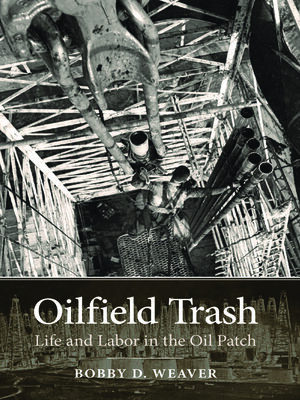Oilfield Trash
ebook ∣ Life and Labor in the Oil Patch · Kenneth E. Montague Series in Oil and Business History
By Bobby D. Weaver

Sign up to save your library
With an OverDrive account, you can save your favorite libraries for at-a-glance information about availability. Find out more about OverDrive accounts.
Find this title in Libby, the library reading app by OverDrive.



Search for a digital library with this title
Title found at these libraries:
| Library Name | Distance |
|---|---|
| Loading... |
When the first gusher blew in at Spindletop, near Beaumont, Texas, in 1901, petroleum began to supplant cotton and cattle as the economic engine of the state and region. Very soon, much of the workforce migrated from the cotton field to the oilfield, following the lure of the wealth being created by black gold.
The early decades of the twentieth century witnessed the development of an oilfield culture, as these workers defined and solidified their position within the region's social fabric. Over time, the work force grew more professionalized, and technological change attracted a different type of laborer.
Bobby D. Weaver grew up and worked in the oil patch. Now, drawing on oral histories supplemented and confirmed by other research, he tells the colorful stories of the workers who actually brought oil wealth to Texas. Drillers, shooters, toolies, pipeliners, teamsters, roustabouts, tank builders, roughnecks . . . each of them played a role in the frenzied, hard-driving lifestyle of the boomtowns that sprouted overnight in association with each major oil discovery.
Weaver tracks the differences between company workers and contract workers. He details the work itself and the ethos that surrounds it. He highlights the similarities and differences from one field to another and traces changing aspects of the work over time. Above all, Oilfield Trash captures the unique voices of the laboring people who worked long, hard hours, often risking life and limb to keep the drilling rigs "turning to the right."
The early decades of the twentieth century witnessed the development of an oilfield culture, as these workers defined and solidified their position within the region's social fabric. Over time, the work force grew more professionalized, and technological change attracted a different type of laborer.
Bobby D. Weaver grew up and worked in the oil patch. Now, drawing on oral histories supplemented and confirmed by other research, he tells the colorful stories of the workers who actually brought oil wealth to Texas. Drillers, shooters, toolies, pipeliners, teamsters, roustabouts, tank builders, roughnecks . . . each of them played a role in the frenzied, hard-driving lifestyle of the boomtowns that sprouted overnight in association with each major oil discovery.
Weaver tracks the differences between company workers and contract workers. He details the work itself and the ethos that surrounds it. He highlights the similarities and differences from one field to another and traces changing aspects of the work over time. Above all, Oilfield Trash captures the unique voices of the laboring people who worked long, hard hours, often risking life and limb to keep the drilling rigs "turning to the right."







